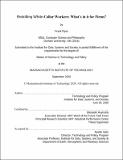| dc.contributor.advisor | Elisabeth Reynolds. | en_US |
| dc.contributor.author | Ryan, Frank,S.M.(Frank Michael)Massachusetts Institute of Technology. | en_US |
| dc.contributor.other | Massachusetts Institute of Technology. Institute for Data, Systems, and Society. | en_US |
| dc.contributor.other | Technology and Policy Program. | en_US |
| dc.date.accessioned | 2021-03-22T17:22:02Z | |
| dc.date.available | 2021-03-22T17:22:02Z | |
| dc.date.copyright | 2020 | en_US |
| dc.date.issued | 2020 | en_US |
| dc.identifier.uri | https://hdl.handle.net/1721.1/130208 | |
| dc.description | Thesis: S.M. in Technology and Policy, Massachusetts Institute of Technology, School of Engineering, Institute for Data, Systems, and Society, September, 2020 | en_US |
| dc.description | Cataloged from student-submitted PDF of thesis. | en_US |
| dc.description | Includes bibliographical references (pages 52-53). | en_US |
| dc.description.abstract | Increasing rates of skill obsolescence amongst white-collar workers resulting from rapid technological and organizational shifts within firms, coupled with an insufficient supply of workers proficient in technical areas such as software engineering and data science, has meant that firms are beginning to look to reskilling their incumbent workers as a means of filling skill gaps. This aim of this study was to examine the process and outcomes of efforts made by a US-based diversified global insurance company between 2016 and 2018 to reskill and reassign approximately 300 employees in the face of changing technological and market demands. More specifically, this involved running an immersive coding program for employees with little or no prior coding experience, with the ultimate aim of finding them new job roles in technical areas such as software engineering and data science. Quantitative analysis of longitudinal employee data, combined with qualitative interviews with program participants and administrators of the program, was used to assess the wide-ranging impacts that program had both on the firm and its workforce. Results suggest that the firm benefitted immensely from the retention of business-related knowledge and a low turnover rate of program graduates compared to externally hired software engineers. The majority of program participants also benefited from receiving free technical skills training, resulting in improved career prospects, however inefficiencies in the onboarding process for placing code school graduates on to new technical teams meant that some unfortunate participants were unfairly disadvantaged. Overall, this study provides encouraging evidence for the potential for white-collar reskilling programs to bring about positive outcomes for both firms and their workers, with several lessons learned for future implementations of similar programs. | en_US |
| dc.description.statementofresponsibility | by Frank Ryan. | en_US |
| dc.format.extent | 53 pages | en_US |
| dc.language.iso | eng | en_US |
| dc.publisher | Massachusetts Institute of Technology | en_US |
| dc.rights | MIT theses may be protected by copyright. Please reuse MIT thesis content according to the MIT Libraries Permissions Policy, which is available through the URL provided. | en_US |
| dc.rights.uri | http://dspace.mit.edu/handle/1721.1/7582 | en_US |
| dc.subject | Institute for Data, Systems, and Society. | en_US |
| dc.subject | Technology and Policy Program. | en_US |
| dc.title | Reskilling white-collar workers : what's in it for firms? | en_US |
| dc.type | Thesis | en_US |
| dc.description.degree | S.M. in Technology and Policy | en_US |
| dc.contributor.department | Massachusetts Institute of Technology. Institute for Data, Systems, and Society | en_US |
| dc.contributor.department | Technology and Policy Program | en_US |
| dc.contributor.department | Massachusetts Institute of Technology. Engineering Systems Division | |
| dc.identifier.oclc | 1241254099 | en_US |
| dc.description.collection | S.M.inTechnologyandPolicy Massachusetts Institute of Technology, School of Engineering, Institute for Data, Systems, and Society | en_US |
| dspace.imported | 2021-03-22T17:21:30Z | en_US |
| mit.thesis.degree | Master | en_US |
| mit.thesis.department | ESD | en_US |
| mit.thesis.department | IDSS | en_US |
